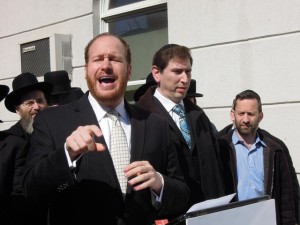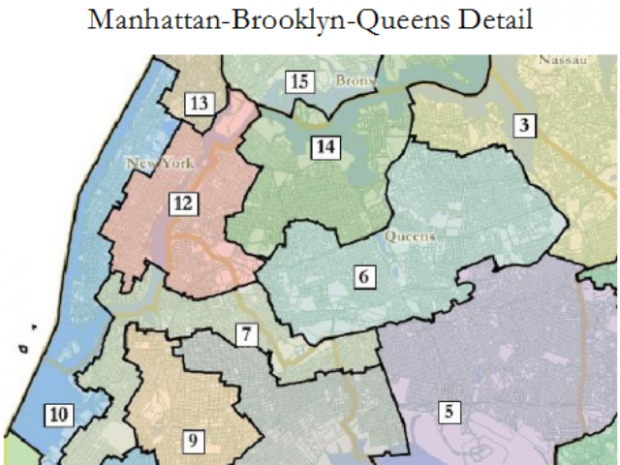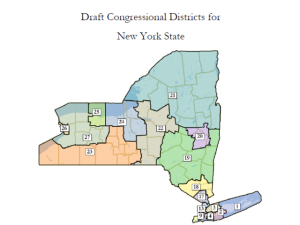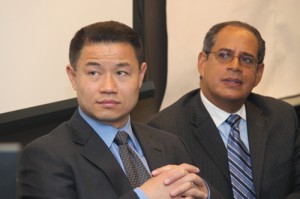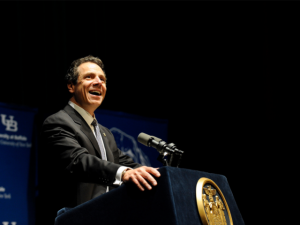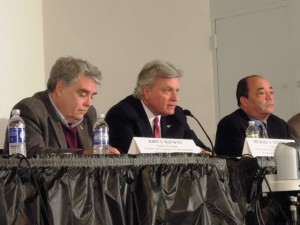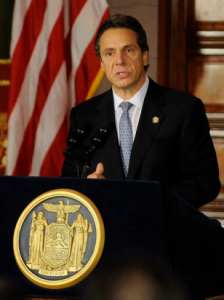Colby Hamilton appears in the following:
'The Capitol Pressroom' with Susan Arbetter
Wednesday, March 07, 2012
 Today on "The Capitol Pressroom":
Today on "The Capitol Pressroom":
Analysis of Super Tuesday’s results, and the latest on congressional redistricting with Bruce Gyory and Dave Catalfamo.
Senator Tony Avella (D-Queens) is demanding public hearings on legislation having to do with gas drilling in New York.
Assemblywoman Ellen Jaffee (D-Suffern) of Rockland County is angry over an attempt by United Water to use her in its push to build a desalination plant in Haverstraw.
For show archives, please visit The Capitol Bureau's website here.
Koch emails legislators: Don't take a deal on redistricting
Wednesday, March 07, 2012
Former Mayor Ed Koch with Congresswoman Carolyn Maloney (Colby Hamilton / WNYC)
Former New York City mayor Ed Koch launched the latest salvo in the deal-or-no-deal redistricting battle. Koch, who pushed lawmakers during the last election to sign pledges supporting an independent redistricting process, is calling on them now to reject any sort of deal that would see a promise to pass a constitutional amendment in exchange for Governor Andrew Cuomo's signing the lines into law.
"A constitutional amendment is worthy of support on its own, of course, but not at the expense of improved lines now," Koch writes. "That is only good for the people who are counting on Albany staying exactly the way it is for another decade, but most New Yorkers think that's far too long. Voting for anything less than a 2012 independent commission would violate the pledge that so many lawmakers signed and campaigned on.
"We know there is a lot of pressure on you to support such a deal, or there will be. But if you still stand by your original pledge, as we hope you do, you should oppose it. And if it passes anyway and Governor Cuomo vetoes it, we hope you will sustain that veto."
Koch, of course, has been burned before by those who promised an independent process this time around. This might be more of a shot across the bow of those senators and members of the assembly who signed the NY Uprising pledge during their campaign and who Koch now labels "Enemies of Reform."
The full letter is after the jump.
Are these New York's future congressional lines?
Tuesday, March 06, 2012
With the release of her draft maps, magistrate judge Roanne Mann moved the congressional redistricting process forward in a major way. But these aren't the first set of maps that have been the focus of intense speculation. Most recently the senate and assembly both presented the courts with plans that got treated with significant interest by the the media, commentators and the public.
A number of people, including potential candidates for congress, have referred to these lines in relation to the state legislature's own process for redrawing maps.
"We should not jump to the conclusion that these will be the final lines, as the state legislature may yet come to an agreement on a map that would supersede the proposal released today," said Tom Wilson, who has been playing a run against Republican Congresswoman Nan Hayworth in the Hudson Valley.
"We sincerely hope that Albany gets its act together and agrees on more sensible congressional lines so that the Special Master's proposal doesn't become law," said The Woodhaven Residents' Block Association after seeing their neighborhood divide between two districts in Mann's plan.
Which raises the question, are these the lines we'll have for the next ten years?
The answer could be yes. First, a note on the schedule for the court's process. All the groups and individuals involved in the Favors case Judge Mann is presiding over need to have written comments on her proposal in by 9 am tomorrow, March 7. There's been speculation she may call the parties back into court to discuss what they say later this week.
But what's certain is the magistrate judge will have a revised, final set of proposed maps to the three-judge panel overseeing this whole process by Monday, March 12. Then, the parties will again be able to comment on the maps directly to the three-judge panel before the panel meets on March 15. The expectation is that a final decision on the maps will be made shortly thereafter, as petitioning to get on the congressional primary ballot begins two weeks from today.
There remains an outside chance the legislature could step up and pass congressional maps before the three-judge panel does next week. It would require not only passing the maps, but changing the date of the congressional primary from June 26 to a later date. The federal judge that set the June date, Judge Sharpe, left the door open for this to happen, but so far the senate and assembly have been unable to come to an agreement on a date.
Oh, yeah: the legislature also needs to get both the Department of Justice to sign off on the maps--something they have up to 60 days to do--and Governor Andrew Cuomo to sign them. He's promised to veto maps if they remain "hyper-partisan."
Common Cause's Susan Lerner praised the maps, calling the proposal "a vast improvement over the self-serving interests of the Legislature," while Citizens Union's Dick Dadey said, "The Congressional maps presented today by the court show that an independent process can produce better districts than those drawn by the legislature." Were these the sort of hypo-partisan maps the Governor was imagining?
Still, according to one line of thinking, it might come down to whether or not the congressional delegation is all that unhappy about the maps. Some, like Representative Gary Ackerman, have signaled they're fine with what's presented and are ready to run. Others, like Congressman Jerry Nadler, barely saw their districts move. Others still, like a good chunk of the Long Island delegation, might simply see the redrawn districts as good enough and move in.
In a sense, it may come down to whether or not a critical mass develops among the delegation; if there's not a fight from them for better lines, should the state legislature even bother?
So far, it's uncertain where things stand on this point. Both Assembly Speaker Sheldon Silver and Senate Majority Leader, through a spokesman, have indicated they'd still like to make a deal on congressional districts. They'd better hurry. Time's running out.
Councilman Greenfield: We don't want a 'Super Ghetto' senate district
Tuesday, March 06, 2012
Speaking with a few dozen members of the southern Brooklyn Jewish community behind him, Councilman David Greenfield denounced the creation of a so-called "super Jewish" state senate district during this year's redistricting process, calling it instead a "super ghetto."
"We're not going to allow for a backroom, smoke-filled deal to dilute the strength of our community," Greenfield said during a press conference in the Borough Park neighborhood of Brooklyn.
A number of speakers from various community groups and religious organizations spoke, including Chaim Deutch of Flatbush Shomrim, Rabbi Chaim Goldberger of Satmar, Mendel Zilberberg of Community Board 12, and Rabbi Yechezkel Pikus of the Council of Jewish Organizations of Flatbush.
"We are opposed to this so-called 'super-jewish' district. This district may be super for other people, but it's not super for the Jews," Greenfield said.
The proposed district in question is part of the first draft of state senate lines drawn up by LATFOR, the task force made up of state legislatures who are responsible for drawing the new lines. If created, the 17th district would stretch from Borough Park down through the Midwood section of Brooklyn (see below).
Greenfield compared the creation of a senate district carved out for the predominately Orthodox Jewish community in the area to the creation of the Venetian ghetto 500 years ago.
"They told the Jews, 'It'll be good for you; why do you want to live with everybody? We're going to separate you. We're going to put you in a neighborhood.' And they came up with a brand new name for this neighborhood. They called it a 'ghetto'," Greenfield said. "This, folks, is nothing more and nothing less than a ghetto district."
The Councilman refused to say who, specifically, it was that wanted to create this "ghetto district" but the push for the high-density district has come from the Senate Republicans, who both drew the maps and see it as a potentially winnable seat this year. Greenfield said he testified before LATFOR, calling for more concentrated districts in the area that is now divided among as many as six senate districts.
"They gave us one--one senator. A senator that can be easily marganilized. A senator who can be dismissed. A senator people don't have to pay attention to," the Councilman said.
The battle over the future district lines has been playing out behind a special election for the nearby senate district recently vacated by disgraced former senator Carl Kruger. Another local council member, Lewis Fidler, is running against Brooklyn Republican Party vice-chairman David Storobin.
The candidate was unable to attend at least two recent debate appearances due to illness. But the illness was announced ten days ago and Fidler has been scarcely seen publicly, with just two weeks left to go in the campaign.
Requests were put in to Councilman Fidler's campaign for an update on his status. They have yet to be returned.
'The Capitol Pressroom' with Susan Arbetter
Tuesday, March 06, 2012
 Today on "The Capitol Pressroom":
Today on "The Capitol Pressroom":
Governor Andrew Cuomo joins Susan at around 11:05.
Not everyone is a fan of the Governor's DNA Database Bill. In fact, the Innocence Project and the New York State Bar Association would like to see some significant changes. NYSBA President Vincent Doyle has the lowdown.
We may meet Senate candidate Joe Carvin who is in Albany today.
It's Farm Bureau Lobby day! FB President Dean Norton returns to the Plywood Hut to discuss Bureau priorities such as the Delinquent Property Tax Reform, why farmers’ property taxes are capped at 10% rather than 2% … and where the best farmers markets with homemade chocolate baked goods can be found on any given Tuesday in March. In walking distance of the Capitol.
Darrel Aubertine has had quite a year. The Commissioner of Ag & Markets has not only been lobbying Congress for New York's fair share of the Farm Bill, he's been helping to spearhead the massive clean-up and rebuild that been taking place since September's storms.
Investing in farms and farmland is critical to the economy of upstate New York. David Haight, the New York State Director of the American Farmland Trust reviews the work the group has accomplished over the past year, and why it sometimes faces opposition from the strangest places.
For show archives, please visit The Capitol Bureau's website here.
Assemblyman Lancman fine with proposed minority-majority 6th Congressional District
Tuesday, March 06, 2012
Just hours after a federal judge's proposed congressional maps were picked up by the media, Assemblyman Rory Lancman, who had intended to run against Republican Congressman Bob Turner, saw himself drawn into an entirely new district--one without an incumbent--in the judge's plans.
The Special Master’s lines came out today, and while I can’t predict what the final lines will ultimately look like, the Special Master’s district six is centered around my home and communities that I have represented in the Assembly, on the community board and as a civic leader for over twenty years. I look forward to the opportunity to run for Congress when the lines are finalized.
Let's take a look at that proposed 6th district. For starters, this appears to be pretty close to the district AALDEF and other community groups proposed District 5 in their UNITY map:
And the court's District 6 map:
A quick look at the voting age population of the new district:
White: 39.9%
Hispanic: 17.1%
Black: 4.8%
Asian: 38.8%
Which is all to say, the district's voting age population in majority minority, and the largest chunk in that group is the Asian community. It will be interesting, if these lines become real, to see how that dynamic shapes the candidates in the race.
Federal judge releases draft congressional maps--updated
Tuesday, March 06, 2012
Yesterday, federal magistrate judge Roanne Mann held a hearing to review the proposed congressional maps submitted by the state assembly and senate, as well as groups like Common Cause. Much of the hearing was over the scope the parties hoped the judge would take--the legislative houses and others pushed the judge to make the scope narrower, to look at the existing districts as starting points, and to consider incumbency.
Well, Judge Mann worked fast: below are the draft congressional maps released by the court late last night. And as you can see the judge appears to have decided ignored both the state senate and assembly's draft maps for downstate districts.
Some highlights from the city:
- The Asian community centered in Flushing would have an Asian-influenced district in Queens.
- The seat occupied by Bob Turner would cross into Nassau, and would also take on the entire Rockaway Peninsula--and pair Turner with Meeks (h/t Colin Campbell at Politicker)
- The Towns district stretches all the way to Coney Island.
- Grimm's district would move further into Bay Ridge, picking up some of Sheepshead Bay in the process.
- Maloney's district would gobble up the Williamsburg/Greenpoint neighborhoods in North Brooklyn, taking them out of Rep. Nydia Velázquez's district.
- Charlie Rangel's district would remain in Manhattan, moving from the upper west to the upper east side of the island, but would continue the trend of being majority Latino.
- It looks like the court decided to, more than anyone, blow up both the Turner and Ackerman seats.
Colin and I both stand corrected by Queens' own Evan Stavisky. Via Twitter: "Rep. Meeks' district was NOT combined with Turner. Turner's section of the Rockaways was just added to Rep. Meeks' district."
The three most important pieces of New York's ongoing redistricting saga
Monday, March 05, 2012
Federal magistrate judge Roanne Mann is bringing together the sides with skin in the redistricting game today at a hearing to review legislative and community activist proposals for how the state’s 27 congressional districts could be drawn.
The hearing comes as state lawmakers and Governor Andrew Cuomo are reportedly in the midst of trying to hammer out a deal that would see better lines for the Governor to pass alongside a constitutional amendment to change the redistricting process going forward.
But as Jimmy Vielkind of the Albany Times-Union reports, the process is far from finalized:
Gov. Andrew Cuomo, who denounced LATFOR's first draft of lines as "hyper-political," is wielding the threat of a gubernatorial veto to make lawmakers agree to a new law and changes to the State Constitution that would rip the map-making pen from legislators themselves.
Assembly Democrats outlined a draft package of possible changes last week, the Times Union reported Thursday, but the new system still allows for final revisions by legislators — something that has left some good-government advocates uneasy.
A Cuomo administration source said Sunday that there was no overall agreement, and as such, "if they are drafting now then they are drafting for a veto."
Even as the redistricting morass continues, three distinct pieces of the overall puzzle should be watched closely:
'The Capitol Pressroom' with Susan Arbetter
Monday, March 05, 2012
 Today on "The Capitol Pressroom":
Today on "The Capitol Pressroom":
According to State Senator Mike Gianaris, he's been consistently outspoken on government reform whether serving in the Senate or Assembly. On today’s Capitol Pressroom, the Queens Democrat discusses Cuomo's comments, today’s New York Times editorial, and the defensive stance taken on Friday by Assemblyman Jack McEneny, a fellow Democrat and the Assembly co-chair of LATFOR, upon learning of Gianaris’ criticism of a constitutional amendment in-the-making.
Siena Pollster Steve Greenberg returns, wielding data.
We hear what former Republican gubernatorial candidate John Faso has to say about relationships, specifically the one between Republicans and women in light of Rush Limbaugh’s latest comments.
Adam Lisberg, editor of City & State New York shares highlights from the latest issue of the paper, including a story about increasing highway & bridge tolls in order to pay for transportation infrastructure.
For show archives, please visit The Capitol Bureau's website here.
Liu, like DiNapoli, wielding pension power to push corporate behavior
Monday, March 05, 2012
Embattled New York City Comptroller John Liu announced this morning that the city's pension funds had worked with two companies they invest in to agree to protect workers against sexual orientation and identity discrimination. Like his counterpart at the state level, Comptroller Tomas DiNapoli, Liu is using the city's public pension funds to push forward a political agenda--one of the benefits defenders of the pension systems point to for protecting them.
The companies in the agreement, Dick’s Sporting Goods and Constellation Brands, a large alcoholic beverage distributor, will now not have to put a proposal forward to shareholders to "adopt a written policy barring discrimination based on sexual orientation or gender identity," according to the report.
“These companies are to be commended for upholding basic rights of their employees,” Comptroller Liu said in a statement. “As long-term shareholders we know that when companies refuse to protect their employees against discrimination, they drive away the best and the brightest. Equal rights in the workplace help ensure that long-term shareholder value is protected and build a more equitable society.”
Last month, Comptroller DiNapoli announced an agreement with three California-based companies to disclose their corporate political contributions. DiNapoli, in an interview with the Empire in January, DiNapoli pointed to the ability of pension funds as vehicles for social change as one of their additional benefits:
“By aggregating that capital, we can not only maximize the power to get superior return,” the Comptroller said. “You also can focus on the other ways in which you can make those companies you invest in be responsible corporate citizens in a way that makes their business model sustainable and profitable.”
Cuomo's poll numbers down, voters' support for ed reform is mixed
Monday, March 05, 2012
In the latest Siena College poll, Governor Andrew Cuomo's job performance and favorability numbers have slid, though they remain "the envy of any politician," according to Siena pollster Steven Greenberg.
Cuomo is viewed favorably by 69 percent of voters and unfavorably by 25 percent of voters surveyed. That's down from 74-18 percent last month, according to Siena. He retains a high job performance rating at 57 percent, though that, too, has dropped from 61 percent last month.
“While Andrew Cuomo's numbers are down a little from last month, they remain impressively high as he enters his 15th month as Governor,” Greenberg said in a statement.
Voters may be responding to the recent battle over teacher evaluations. Those polled were split on the value of the teacher evaluation system being implemented across the state, with half of voters saying it will improve the quality of education. Fifty-seven percent believed the deal was fair to teachers.
Yet a plurality of those polled--45 percent--believe the Governor's actions has had no effect on the quality of education in the state, while 27 percent say he's made it more of a problem, and only 22 percent say he's improved it.
“A bare majority of voters thinks the new teacher evaluation system will improve the quality of education in New York, however, a sizable minority believes the new system will have no effect on the quality of education,” Greenberg said. “Clearly voters do not see the issue of teacher evaluations as being the 'be all and end all' to improving the quality of education for New York‟s public school students.
"Interestingly, while the Governor was publicly seen as a leader in the fight for the new evaluation system, education is one key issue area where voters are not giving the Governor high performance grades.”
On the issues, voters are now evenly divided on the issue of legalizing gambling--48 percent support, 49 percent opposed--down from 52-44 percent support last month. The same can't be said for the creation of a new pension tier and the Governor's proposed convention center out in Queens: 66 percent support the pension reform, while 60 percent support the Queens convention center.
“A constitutional amendment to legalize non-Indian casinos in New York divides voters virtually down the middle. However, this is not an issue that divides voters by region, party or ideology. In fact, voters of every region, party and ideology are nearly evenly divided,” Greenberg said. “Gender and age are more predictive of voters‟ positions, with men more supportive than women and young voters more supportive than older voters.
“Support remains strong – 66-29 percent – for creating a new pension system to save government employers money and ask future government employees to contribute more toward their retirement. Pension reform has the strong support of voters from every party and region, and even has majority support among voters from union households,” Greenberg said. “The Governor‟s proposed new Queens convention center also continues to enjoy two-to-one support, including at least 60 percent of voters from every region and party.”
State Assembly: Our redistricting amendment is better than Gianaris'
Friday, March 02, 2012
This article has been updated.
From left, Assemb. Jack McEneny, Sen. Michael Nozzolio and Sen. Martin Malavé Dilan (Colby Hamilton / WNYC)
Assembly Speaker Shelly Silver’s press office just released a statement on behalf of Assemblyman Jack McEneny, the Albany-based Democrat representing the Assembly’s Democratic majority in the state’s redistricting process. The statement, according to McEneny, is in response to the criticism being levied against the reported language of a constitutional amendment that appeared this morning in the Albany Times-Union. The amendment would be part of a compromise that would allow the Governor to sign a second, supposedly improved set of district lines for the state senate and assembly.
The statement appears to put daylight between what Assemblyman McEneny described in the TU article, and some of the push back coming from Senate Democrats, in particular Senator Michael Gianaris, who was the co-sponsor of a bill last year to establish an independent redistricting process in 2012:
While we share a common goal of permanently reforming New York’s redistricting process, the constitutional amendment currently being discussed by the Assembly is stronger than the Senate Minority’s proposal in several key respects. Future redistricting plans will be subjected to tough standards not contained in the plan put forth by the Senate Minority and, as well, the amendment would be accompanied by a statute implementing those changes.
According to the statement, in the event the plan drawn by the future “independent commission” was rejected by the legislature, lawmakers would “be limited to those that affect no more than two percent of the population of the district being altered, making it much harder to modify the commission’s proposals.”
The statement goes on to say the Assembly proposal would “provide crucial protections for language and for racial minorities,” as well as require a justification for district population deviations, and give greater restriction to political activities for the commission members.
The statement comes after a day of push back from lawmakers and good government activists incensed over the details of a possible constitutional amendment on redistricting.
Common Cause held a conference call earlier to discuss the status of both congressional and state redistricting efforts. The group’s executive director Susan Lerner addressed the constitutional amendment issue.
“We would just like to say we have consistently been calling for an open discussion about what should be in any constitutional amendment,” she said, according to City and State’s Laura Nahmias. “We think quite frankly it would be a scandal if massive changes to the redistricting process were introduced under cover of darkness.”
Democratic state Senator Liz Krueger issued her own statement on the state of the process saying, “The reports I have heard of a deal on a constitutional amendment make two things clear: the proposed amendment is too weak to work, and New York's voters would have to accept ten more years of hyperpartisan, racially discriminatory maps to get this too-little, too-late reform.”
And earlier today, Democratic state Senator Michael Gianaris told the Empire, “The entire point about the constitutional amendment is that we could change [the ability of the legislature to have the final say over the lines]. So to actually enshrine in the constitution that the legislature would have the final say would be regress.”
Bill gets his bill: Public Advocate gets city's pensions to invest more locally
Friday, March 02, 2012
Last month we had a piece talking about Public Advocate Bill de Blasio's push to get the city pension funds investing locally.
It looks like it was a success: this week, the New York City Employees’ Retirement System, on which de Blasio sits as a trustee, adopted a resolution to increase investment in local investment opportunities in areas like affordable housing and infrastructure.
“With City unemployment stalled at just under 9 percent, it was imperative for us to act quickly to put the power of New York’s pension fund to work creating jobs across the five boroughs,” the Public Advocate said in a statement. “The investments that will result from the passage of my resolutions are proven to provide responsible returns while also creating jobs – this is a win-win for New York City.”
The proposal would see an additional $350 million in investments go to projects in city.
CWA endorses Jeffries for Congress against Rep. Towns
Friday, March 02, 2012
Reid Pillifant has the story on CapitalNewYork.com about the Communication Workers of America throwing their support behind Assemblyman Hakeem Jeffries in his bid to unseat Congressman Ed Towns.
"We believe that he has crossed over at least to the right wing of the Democratic Party," Pillifant has CWA District 1 vice president Chris Shelton quoted as saying.
Reached by phone, CWA District 1 legislative and political organizer Bob Master said, "On a range of issues, the incumbent has not stood with working people. The most glarin are all these votes on trade agree that we opppose.
"Someone who represents a district in Brooklyn like that should be a champion. We need more champions in congress and in Washington and Hakeem Jeffries has been that kind of champion for us in Albany."
This is the Jeffries third union endorsement in the race.
Federal judge lays out the rules for March 5 redistricting hearing
Friday, March 02, 2012
At the end of today, everyone who has skin in the congressional redistricting game will need to have their proposals for new lines into Judge Roanne Mann. In preparation for the hearing on Monday, March 5, Judge Mann has laid out the ground rules for those who'll present their arguments on Monday:
Given the March 12th deadline by which this Court must issue its report and recommendation on a new Congressional redistricting plan for the State of New York, as well as the number of parties and non-parties providing input into the process and expected to participate in the proceeding scheduled for Monday, it was not the Court’s intention to conduct a trial-type evidentiary hearing on March 5th. Instead, the hearing will proceed in the manner herein described.
Each group of parties will be given up to twenty (20) minutes to present its argument to the Court. Counsel representing parties with similar interests are encouraged to decide in advance which attorney will address a particular issue; the Court will not entertain repetitive arguments. Each party group may reserve up to three (3) minutes of its time to present a brief response, at the conclusion of the party presentations, to the other parties’ arguments. Such responses must be limited to correcting misstatements of fact or law, and may not include new or repetitive affirmative arguments.
Time permitting, interested non-parties who have submitted proposed plans or substantive comments and have registered by today’s deadline may be afforded up to five (5) minutes to address the Court. Non-parties and organizations with affiliated interests are encouraged to select one representative to speak on their behalf for the allotted time. Non-party presentations must be limited to the topic of New York State Congressional redistricting.
Cuomo takes a swipe at lawmakers over redistricting
Friday, March 02, 2012
This article's been updated.
Governor Andrew Cuomo, appearing on Fred Dicker's TALK 1300-WGDJ show this morning, took a swipe at state legislators--in particular Democratic Senator Michael Gianaris--who have been vocally critical during this year's redistricting process. Dicker and the Governor were talking about news reports of a possible constitutional amendment deal when the subject turned to the language of the amendment.
Dicker mentioned the amendment details reported today in the Times-Union appear to be similar to those in a bill sponsored last year by Gianaris. It would have replaced the current legislative-controlled redistricting process with one where the minority parties had more of a say, among other things. The language of the constitutional amendment, as described by T-U and pointed out on this blog, is somewhat similar. Gianaris says he's opposed to a constitutional amendment that would keep the legislature involved in the redistricting process.
"There's been a lot of debate on a constitutional amendment, a lot of drafts," the Governor said. "I think Gianaris had something to do with the draft when he had a different position on the issue."
The comment elicited a chuckle from Dicker.
The Governor and others have been critical of legislators, and specifically Senate Democrats, for not being more proactive on the issue of redistricting when they had the chance.
"It's the convenient politics of the time, let's be honest," Cuomo said about the contentious debate over the process this year. "When the Democrats were in the majority, I didn't see them pass redistricting reform, right? They had the opportunity to do this. They're now all talking about how it should work--well why didn't you pass the bill when you were in the majority?"
Reached by phone for a comment, Gianaris said, "My legislative proposal was required by the constitution to have the legislature have the final say. The entire point about the constitutional amendment is that we could change that. So to actually enshrine in the constitution that the legislature would have the final say would be regress.
Cuomo also gave an update on the overall redistricting process, and the talks happening to reach a consensus: "Basically, we're nowhere."
He went on to further discuss his position in the process, which other blogs have picked up on:
"If there were acceptable lines—not the current lines, which are unacceptable—if there were acceptable lines, and if there was a real constitutional amendment, and if there was statutory language that could protect the people if the legislature changes their mind and doesn't want to pass a constitutional amendment, then that would be a possible resolution," the Governor said.
'The Capitol Pressroom' with Susan Arbetter
Friday, March 02, 2012
 Today on "The Capitol Pressroom":
Today on "The Capitol Pressroom":
Ken Lovett of the New York Daily News updates us on the latest redistricting news. And over which issue George Takei is threatening to debate Donald Trump.
Former AG Bob Abrams says he has the answer to the redistricting question.
The Religious Land Use and Institutionalized Persons Act or RLUIPA has combined two topics, prisoners and zoning and it's creating a burden on municipalities in the lower Hudson Valley. Patty Salkin, the Dean of the Government Law Center at Albany Law School and a land use expert joins us to explain. Plus we will speak with a documentary filmmaker Anne MacGregor who has produced a film "America's Holy War" about the issue.
And the town of Vestal is definitely *not* all pro-gas drilling. Sue Rapp will explain.
For show archives, please visit The Capitol Bureau's website here.
Details emerge on possible redistricting amendment
Friday, March 02, 2012
The Times-Union's Casey Seiler has a piece up today about the emerging details of a possible deal between Governor Andrew Cuomo and the state legislature for a constitutional amendment to change the state's redistricting process.
"A possible constitutional change to New York’s redistricting process would create a 10-member independent panel to draw the state’s political lines beginning in 2021, but would allow the Legislature to make final tweaks to the plan if the Assembly and Senate fail to pass it after two tries," Seiler writes.
Earlier this week we broke down the battle brewing over how to amend the state's constitution to get independent redistricting in New York. The debate comes down to how much the legislature remains in the process. According to Seiler's piece, the plan being discussed between Assembly Democrats, Senate Republicans and Governor Cuomo would look pretty similar to the Plan A we identified on Wednesday:
The deal being discussed would create a panel made up of eight members appointed by the legislative conferences: two appointees apiece from the majority and minority in each chamber. The eight would then independently select two additional members. Those eligible would have to be out of government service for three years before their appointment, and appointments would have to be made two years before map-drawing could actually begin.
Back in January we ran down what, based on past independent redistricting bills, a constitutional amendment could look like. It turns out this isn't too far off from the process Cuomo and legislators were proposing a year ago as legislation to make the current process more independent.
But now one of the sponsors of the bills from last year, Democratic Senator Michael Gianaris from Queens, is vocally criticizing an amendment that would codify the legislatures influence in a new redistricting amendment.
"I have trouble believing what I read in the paper [about the proposed amendment language] would pass the straight-face test," Gianaris said in a phone interview this morning. "You can be sure that the senate Democrats are firmly in support of truly independent and fair redistricting. What was proposed yesterday would be a disaster."
Gianaris appears to be in the Plan B camp we identified earlier this week, which would like to see the legislature cut out of future redistricting process. The plan details floated in a series of op-eds and statements would look more like the process California now uses. Professor Gerald Benjamin of SUNY New Paltz distilled the details in his op-ed in the Times-Union last weekend:
A constitutional amendment must provide for an independent commission with an odd number of members (5 to 13) appointed by a diversity of authorities exclusively from a pool of interested citizens. Lobbyists, elected officials and those directly or indirectly dependent upon them for employment could not serve. Members would reflect the political and demographic diversity of the state.
They would have a clear timetable and employ clear criteria, including in order of priority: compliance with federal requirements, observance of the integrity of the state’s regions — defined by its natural and built environment — and recognition within regions of social and demographic communities of interest.
Use of data reflecting partisanship or incumbent residency in designing districts would be prohibited. Finally, the Commission’s decisions would not be subject to revision by the Legislature.
A 'stunned' Liu works on damage control in fundraising scandal
Thursday, March 01, 2012
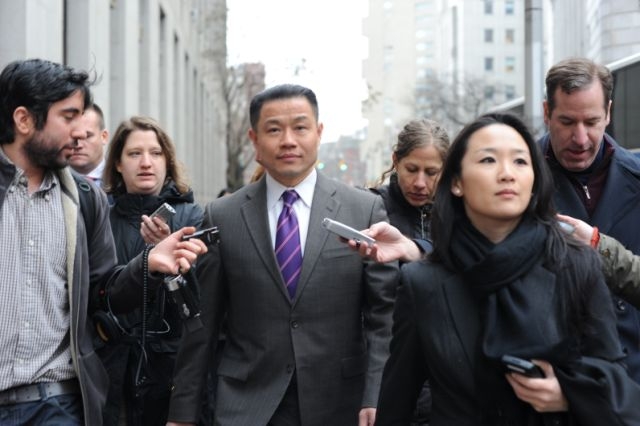
City Comptroller John Liu says he’s still “stunned” by the arrest of his campaign treasurer, Jia “Jenny” Hou. He said, “at this point there are probably a few things that will stun me again.”
Still, it was business as usual for John Liu on Thursday. He kept a busy public schedule, stopping to speak briefly with reporters on his way to an event at the Chinese Benevolent Association in the afternoon. He appeared stressed, but Liu said he was “moving forward.”
“My campaign has been accused of many allegations. My supporters have been accused. My staff, my campaign staff has been accused,” Liu elaborated. “At some point, as I've always said, like with every other candidate, I'm responsible for what happens with my own campaign and will continue to do so.”
Judge orders LATFOR to hand over data used to draw maps, sans incumbent info
Thursday, March 01, 2012
Here’s an interesting tidbit from the legal process federal magistrate Roanne Mann set up to get as much info as possible before she drafts congressional lines for New York.
In the midst of a massive upload of map plans from the state Assembly and Senate, as well as Assembly Minority Leader Brian Kolb and community organizations who have drawn their own maps, the issue of taking incumbency into account in the drawing of lines was raised.
At the February 27 hearing that saw Mann charged with coming up with the schedule for drawing maps, the lawyers for the senate and assembly had asked the judge find a way to have incumbency be part of the conversation. In a follow up letter to the judge, Senate Republicans’ lawyer Michael Carvin laid out the case for “why incumbency protection is an appropriate factor for the Court to consider in drawing redistricting maps.”
“Preserving the cores of existing districts—sometimes also referred to as incumbency protection—is a well-established, traditional districting principle in New York,” Carvin writes. He goes on to cite numerous cases to show that “this Court has recognized[] preserving the cores of existing districts is ‘an important and legitimate factor’ in Congressional redistricting due to ‘the powerful role that seniority plays in the functioning of Congress.’”
It’s not a flat-out refusal to take incumbents into account when drawing new lines, but an order issued by Judge Mann today appears to signal an interest in at least seeing how things look when incumbents aren’t part of the equation. (The entire chronological history of the case can be seen online here.)
The order, issued this morning, tells LATFOR to send over the data they plug into their computer software to draw maps. But there’s a note attached: “No political or other data, including incumbent residence, shall be included with the data provided.”

